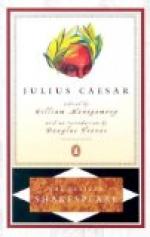|
This section contains 7,919 words (approx. 27 pages at 300 words per page) |

|
Stephen M. Buhler, University of Nebraska-Lincoln
Postremo cur sancta deum delubra suasque
discutit infesto praeclaras fulmine sedes,
et bene facta deum frangit simulacra suisque
demit imaginibus violento volnere honorem?
(Lucretius, De rerum natura 6.417-20: Lastly, why does he shatter holy shrines of the gods, and even his own illustrious habitations, with the fatal thunderbolt, why smash finely-wrought images of the gods and rob his own statues of their grandeur with a violent wound?)1
In Julius Caesar, Shakespeare depicts a cosmological as well as a political struggle. The correspondential order of things is manipulated on all sides of an increasingly bloody conflict, and the downfall of one faction occurs when its members stop manipulating that order and begin, partly and then thoroughly, to credit it. For that reason alone the play lends itself well to criticism of what might be called "naive Tillyardism."2 A workable argument along such lines...
|
This section contains 7,919 words (approx. 27 pages at 300 words per page) |

|


